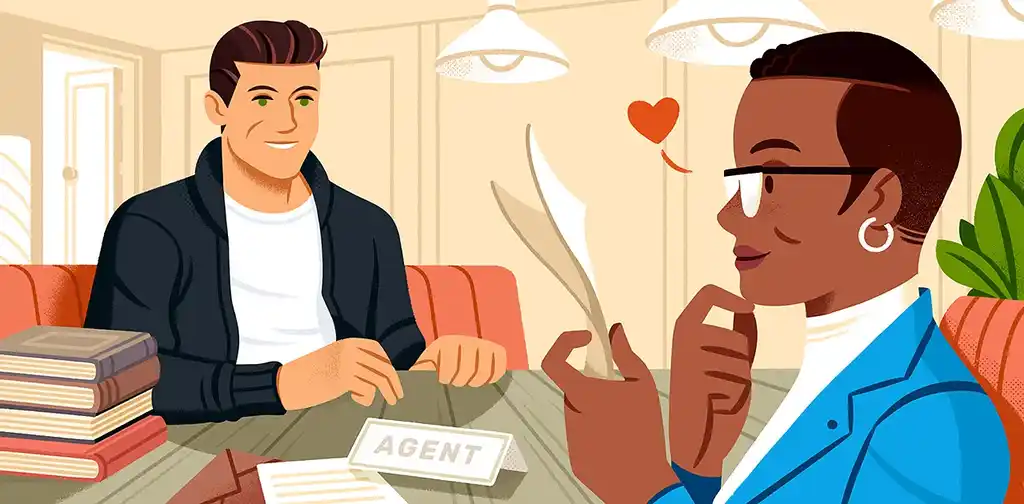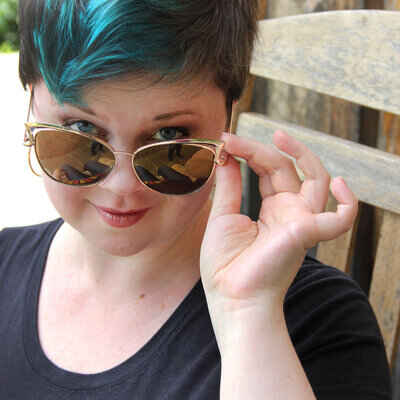Guides • Understanding Publishing
Posted on Dec 06, 2021
5 Query Critiques from Editors and Agents
About the author
Reedsy's editorial team is a diverse group of industry experts devoted to helping authors write and publish beautiful books.
More about the Reedsy Editorial Team →Martin Cavannagh
Head of Content at Reedsy, Martin has spent over eight years helping writers turn their ambitions into reality. As a voice in the indie publishing space, he has written for a number of outlets and spoken at conferences, including the 2024 Writers Summit at the London Book Fair.
View profile →Your query letter will shape an agent’s first impression of your book, so you should take writing and perfecting it very seriously. To give you a sense of the way agents analyze them, we’ve put together some sample query letters, and brought in experts to critique them.
The editors in this article are just a few of the Reedsy professionals offering query letter reviews, an affordable service providing detailed feedback on authors’ queries. Below, they provide suggestions for improving five fictional (but plausible) query letters.
To see the full final versions of these query drafts — polished up with the help of professionals’ critiques — head to the next section of this guide.
Andy Ross: “Begin with the facts”
 For our thriller query, we consulted Andy Ross, a literary agent with over 13 years of experience. As well as providing developmental editing services in commercial, literary, YA fiction, and narrative nonfiction, Andy is the author of The Literary Agent’s Guide to Writing a Non-Fiction Book Proposal.
For our thriller query, we consulted Andy Ross, a literary agent with over 13 years of experience. As well as providing developmental editing services in commercial, literary, YA fiction, and narrative nonfiction, Andy is the author of The Literary Agent’s Guide to Writing a Non-Fiction Book Proposal.
Here's our query and Andy's feedback:
Dear Ms. Brooks,
THE WOMAN IN THE BLACK SALOON begins with a terrible death: a cattle rancher strangled by his own lasso. But when the forensics come back clean, the police have no leads whatsoever. Flash forward to one year later, and the strange murder not only remains unsolved, but the bad publicity surrounding it has destroyed the town’s tourist economy.
Enter Jesse Foster, proprietor and sole remaining bartender at the Lone Star Saloon. Once a thriving local business and tourist attraction, Lone Star has dried up with the rest of the town — and Jesse is sick and tired of waiting for things to get better. Taking matters into his own hands, he soon discovers what the police have been hiding from the public, and realizes that he himself may hold the key to this terrifying case: a faint memory of a mysterious woman in his bar, just hours before that rancher was brutally throttled...
Andy: I’d begin the query with just the facts, title, genre, word count. That's customary, and that is what an agent will want to see first. This second paragraph is a good synopsis, particularly the way he was able to bring out the concept of the book in just a few lines. I get between 10-20 unsolicited queries every day. Some agents get more. So I prefer a query that is brief.
[…] Diana Preston from Chicory Books mentioned to me that you’ve represented similar titles in the past, so I’m hoping it might pique your interest! Finally, I’d just like to say that I’m a great admirer of your client Genevieve Moore’s GUN IN THE GRAVE series. Before researching you, I hadn’t known who represented her, but trust me that she’s been a huge influence on my own work. Please give her my highest compliments, if you would. And thank you very much for your consideration […]
Andy: I’d significantly shorten or completely eliminate this final paragraph. I see it a lot. (I call it: "sucking up to the agent".) It's unnecessary.
For a full version of this sample query letter, where we’ve actioned all of Andy’s edits, you can go here.

FREE RESOURCE
Query Letter Template
Learn how to grab a literary agent’s attention with our free template + checklist.
Jon Darga: “Always be specific”
 For our nonfiction query, we reached out to Jon Darga, currently an agent at Aevitas, and former editor at Penguin Random House with experience across both fiction and nonfiction, including multiple award-winning and bestselling titles. Here’s a sample:
For our nonfiction query, we reached out to Jon Darga, currently an agent at Aevitas, and former editor at Penguin Random House with experience across both fiction and nonfiction, including multiple award-winning and bestselling titles. Here’s a sample:
[...] In PRIMED FOR ERROR, my 70,000-word scientific self-help book, I lead my readers through the story of how the life-changing magic of priming rocket-boosted my academic career and saved my struggling marriage, as well as teaching them how they can apply the principles of priming in their own lives. Weaving together 200 years of psychological research with my own experiences, I cover broad ground with enough specificity and hard scientific evidence to reassure readers they’re in safe hands [...]
Jon: This is good, but I'd like for it to be more specific.
I'd still certainly dip into the proposal, but I'd like more of that work done here in the query letter. Right now it's not clear to me how a + b = c — that is, the concept of priming is present, as is the effect it's had on the author's life, but I still have no idea how the author used priming to influence her life. Try rephrasing to give some examples: "I lead readers through the story of how I used priming IN X WAY to rocket-boost my academic career, and how I used it IN Y WAY to save my struggling marriage."
Are there big examples that you can use to bolster your point? For example, "Most people didn't know this, but Albert Einstein was actually a huge proponent of using priming in his personal life." Or something like that. You really need to make sure you're capturing not just the breadth of how we can use this concept in our own lives, but the sorts of untold stories in that two hundred year history that you'll be uncovering.
[...] Beyond my personal experience using the principles of priming, I have a PhD in behavioural psychology, and have experience lecturing undergraduate and postgraduate students in areas related to this topic. My hope is to bring my academic and teaching backgrounds together to present robust science in an accessible way, similar to Daniel Kahneman’s THINKING, FAST AND SLOW [...]
Jon: I think this needs more details — where is your PhD from, where have you lectured, etc. I like the Kahneman comp, but I think you need more, and Kahneman is huge. It's always best to mix and mingle big comps and more reasonable ones to give a range of what your book might accomplish. Kahneman is a bit like comping your YA to Harry Potter.
To see an updated version of the letter, which has been edited in line with Jon’s suggestions, head here.
Q: How does personalizing a query letter increase its chances of success?
Suggested answer
I'm more concerned with whether your query letter hooks me: I want your title, genre, word count and comp titles at the front. I am even curious to know why you are the exact person to write this book (e.g., 'I'm an arctic research scientist so I set my locked room mystery in a research base', etc). You can put info about yourself in a very short about section in your sign-off paragraph. That said, it doesn't hurt to include something specific to me. For example, suppose you listened to an interview where I said I'm interested in finding a particular type of novel that yours fits with, or you connected with something I posted on social media. In that case, it's good to include this. It makes me think you are keen to work with me and aren't just randomly querying. But with that said, as long as you address the letter to me and then write a strong, gripping query and telling me a small amount about yourself and what that means to you as a writer, I'm less concerned about you including extra personalisation directed at me.
Ariell is available to hire on Reedsy ⏺
The baseline requirement is that you need to address your query to the agent's name; "Dear agent" letters sent out as shotgun emails to five hundred agents will get rejected quickly. Beyond that...my usual suggestion is to offer one or two sentences at the beginning of the query letter showing that you've done your homework. This can be as simple as "I saw on MSWL that you're looking for more multi-POV novels," or "I saw on your agency website that you're interested in cozy fantasy." This shows that you're respecting the agent's time by making sure that what you're sending is aligned with their tastes at the most basic level. Agents know that you're probably querying about ten people at once, and they're receiving perhaps hundreds of queries a day, but the personalization makes it a little more likely they'll spend some extra time looking at yours.
Nora is available to hire on Reedsy ⏺
I think a personalized query letter achieves the same aim as a piece of handwritten, personalized mail: it shows the sender has put thought and intention into what's enclosed.
As a small-press publisher, I certainly understand that manuscript submitting is a numbers game. Authors have every right to query their manuscripts to dozens of publishers and agents simultaneously. But no one wants to be treated like a row on a query tracking spreadsheet! Dear Sir/Madam, to whom it may concern, generic language about the submission's fit within my company's catalog of publications: these tactics suggest the author is taking a slapdash approach to submitting.
Conversely, when a submitting author can demonstrate their familiarity with my press, it comes as a huge relief to me. Of course, I don't expect every submitting author to buy a copy of book I've published before firing off their manuscript. But if an author can reference a title from my manuscript wish list, or if they address me by name, or if they can say in 1-2 sentences how their book aligns with my company's mission statement, then that goes a long way!
Kevin is available to hire on Reedsy ⏺
Kimberley Lim: “Be mindful of the purpose behind every line”

Kimberley Lim is currently managing editor at Gaudy Boy, the publishing arm of Singapore Unbound. She also takes on freelance work, and offers editorial services on Reedsy in a range of genres from self-help and memoir, to literary fiction and women’s fiction, with a particular interest in diverse and underrepresented voices. Kimberley took a look at a query letter for a parenting-focused memoir —here are some of her comments:
Dear Kevin,
In my 30 years as a foster mother, I had one rule: no teenagers.
It wasn’t that I disliked teens, per se. I just didn’t think I could handle them. I was certain that I couldn’t meet the unique challenges of caring for older children, that I wouldn’t be able to bond with them, and that their needs were simply too complex. So, no teenagers. Then, one November night, along came Kay.
When I was asked to provide an emergency placement for a 15-year-old girl, I was immediately full of trepidation. Against my better judgment, and despite my gut instinct that I was the very last person in the world who should take her on, I made up a room and welcomed Kay into my home.
My fears seemed to be confirmed when our relationship was one of mutual discomfort and resistance: neither of us knew how to navigate this strange new family, and attempts to do so left us feeling worse than before. We argued constantly, and never heard the other’s side. It began to seem that our situation was untenable. But we were stuck with one another. After months of stilted back-and-forth, one night (and our biggest argument yet) saw the tide begin to turn [...]
Kimberley: Just because query letters are meant to be short and succinct (about one page long) — and yet seemingly contain everything about your book at once! — be mindful of the purpose behind every line you write, which takes up space. For example, consider the opening of your letter: it takes a while to get to the point, and four paragraphs down, the agent still doesn’t know the title or genre of your book.
Your opening paragraph should be either informative — giving the agent necessary details about the book (word count, genre, title, etc.) — or it should introduce a strong hook that will compel the agent to keep reading. Your first line might actually have some potential for a hook, but keep it short. The rest of the details in these first four paragraphs are either repetitive or nonessential to pitching your story.
[...] This book will connect and resonate with not only foster and adoptive families, but also biological parents who are struggling to connect with their teenage children, or who fear they aren’t equipped to handle their child’s complex emotional needs. Through being candid about my own difficulties, I hope I can support other families who find themselves wading through unfamiliar waters. It is for this reason that I would love to work with you to make this resource available to those who need it [...]
Kimberley: These are nice and reasonable sentiments, but they aren’t the most convincing to an agent. Instead, try to frame this by citing more tangible reasons or facts/stats with regards to why your book will reach the wide readership you say it will. If the reasons are too abstract, don’t force it, and dedicate the space somewhere else.
Instead, a good additional paragraph to explore—and that the query letter is currently missing—is to describe your author platform. Besides selling the book to a potential audience in your query letter, don’t forget to sell yourself in terms of your past accomplishments (if they relate to writing, the topic of the book, or your audience): previous publications, awards won, schooling, membership in any notable communities, etc.
Acknowledging your credentials, as well as giving the agent an idea of who you are and why you’re particularly well-positioned to write this book, is especially key for memoir, where an agent will want to know whose story is being told. If you’re particularly well connected and can show this off in terms of tangible numbers (followers and fans, membership, etc.), even better!
Want to see what the query for Hidden Parent would look like after Kimberley’s critique? You can find it here.
Lindsay Ribar: “Take care with your comp titles”
 To review our query of a teen-centric science fiction novel, we turned to Lindsay Ribar, a former literary agent with Sanford J. Greenburger Associates, who is now a freelance editor specializing in speculative, YA and queer fiction. Here’s some of the wisdom she shared:
To review our query of a teen-centric science fiction novel, we turned to Lindsay Ribar, a former literary agent with Sanford J. Greenburger Associates, who is now a freelance editor specializing in speculative, YA and queer fiction. Here’s some of the wisdom she shared:
Dear Minh,
I am writing to seek representation for my 120,000-word science fiction novel, ELYSIUM DYING. It concerns a dystopian society in a not-so-distant future that has been ravaged not only by mass infertility but also by an alien invasion that threatens to wipe out all existing life. You might think of it as P.D. James’ CHILDREN OF MEN meets Orson Scott Card’s SPEAKER FOR THE DEAD.
Lindsay: These are excellent comp titles; however, the purpose of using comps in a query is to show the agent where your book could fit into the current marketplace. Neither of these books is current! Can you replace at least one (or, ideally, both) of these comps with titles that were published within the last five years?
[...] In all the chaos, only Hazel (herself a devotee of classic science fiction) sees the connection between the disease and the invasion, and knows that the aliens are not as malevolent as they seem. But with power lines down, she has no way of communicating her theory to the higher-ups… and no reason to think they’d believe her, anyway. So she sets off for Washington, D.C. — not to confront the government, but the aliens themselves, who have taken over the Pentagon and the White House [...]
Lindsay: In that very last sentence, can we get a clearer sense of what’s at stake? What is Hazel’s goal? Why must she accomplish this goal, and what stands in her way? Maybe most importantly, what are the consequences if she fails? This is the last line of your summary; take some space and be dramatic! If this were a movie trailer, what would the voiceover be saying in those very last seconds before the BOOM noise and the title drop?
[...] I understand you represent many up-and-coming young sci-fi writers, such as Russell Fleming and Mina Morrell, and I would be thrilled to count myself among their ranks. Fleming's THE BLUE ABYSS has been of particular inspiration to me, as you may be able to tell from reading my manuscript [...]
Lindsay: Shorten this as much as you can and add it to the end of the first paragraph. You don’t need anything in this paragraph except “I’m querying you because you represent Russell Fleming, whose book The Blue Abyss has been of particular inspiration to me.” Or, if you prefer, you can even use The Blue Abyss as one of your comps, and cut the “here’s why I’m querying you” bit entirely since it will already be apparent.
You don’t need to tell the agent that they represent up-and-coming writers; they already know. You don’t need to tell them that you’d be thrilled to count yourself among their ranks; obviously you would, or you wouldn’t be querying! And the phrase “as you may be able to tell from reading my manuscript” could be off-putting, as many agents can be reluctant to sign a new book that’s too similar to one they already have on their list, and that seems to be what you’re implying here.
Taking on board Lindsay’s feedback, here’s the final version of our science fiction query letter.
Marsha Zinberg: “Don’t over-hype your work”
 For our romance query letter, we reached out to Marsha Zinberg, a former executive editor for Harlequin Books with more than thirty years of editorial experience and several RITA award nominations for editing under her belt. Marsha counts many writers of suspense and thrillers among her clientele, as well as romance authors, and also edits selected non-fiction genres, particularly memoir.
For our romance query letter, we reached out to Marsha Zinberg, a former executive editor for Harlequin Books with more than thirty years of editorial experience and several RITA award nominations for editing under her belt. Marsha counts many writers of suspense and thrillers among her clientele, as well as romance authors, and also edits selected non-fiction genres, particularly memoir.
[...] The fiery half of FIRE AND SILK, blacksmith Joseph Ramsey, has never been interested in ladyfolk — nor does he have time to pursue them, working from dusk till dawn to fulfill his commissions and covertly supply the Continental Army with weapons. But when Joe meets Elizabeth Davis, a young woman who comes to him with an unusual request, he’s smitten by her striking looks and sparkling wit. So much so that he agrees to her request, free of charge.
The only problem is, Eliza is newly engaged — to a general, no less. But judging by what she wants from Joe, it’s not off to a very auspicious start. And as the connection between the blacksmith and the lady heats up like freshly forged iron, Joe finds himself caught in the crossfire... in more ways than one […]
Marsha: These paragraphs read more like back cover copy: they are meant to entice the reader to pick up the book, but by keeping the “unusual request” a secret, as an acquiring literary agent or editor, I’m not getting a very good sense of what the conflict or plot of the story actually revolves around. This is an 80,000-word story, so there has to be more than a romance going on.
The selling adjectives like “steamy” and “thrilling” in the first paragraph, or “tantalizing” in the next also contribute to that feeling. Personally, when an author uses such over-the-top “selling” adjectives to hype her own work, it sounds rather self-aggrandizing and suspect to me. Please give me more of the actual plot/conflict aside from the romance.
The “freshly forged iron” simile is clever, but again, feels more like back cover copy than a tightly-worded description of the main action and, most importantly, how does this book stand out? What is special or unique about it in such a crowded field? Tell me that and you are sure to capture my interest.
[...] Fans of Alyssa Cole and HAMILTON lore are sure to find their fix in this tantalizing colonial-era romance. I have spent the past year of my life researching the Revolutionary War, on top of an MA in American History from Ashland University, so readers will not be disappointed by the historical rigor.
As for my writing credentials, in addition to being a finalist for that RWA award, I have published several short stories with HarperCollins’ Escape Publishing. I am also currently working on the next installment in my “Revolutionary Lovers” series, entitled A TOUCH OF FANCY. This one, set in eighteenth-century France, bears some thematic resemblance to the writings of your client Claudette Sauvageot, whom I absolutely adore [...]
Marsha: Citing Alyssa Cole and Hamilton DOES give the reader an impression of the flavor of the books… good work there. But the “are sure to find their fix” sounds like overselling to me. I would be more convinced if the author cited positive reviews from credentialed or influential people other than herself!
Any sales info or reviews on these published works would be excellent to add here. That is what the agent will be interested in. The reference to the “Revolutionary Lovers” ‘series’ implies that the three novels, Midnight Rose, Fire and Silk and A Touch of Fancy are somehow related. Are they related only by theme (ie Revolution?) or are there continuing characters? Does each book stand alone? That would be useful information to add.
Switch “whom I absolutely adore” to “whose work I admire”. It’s not the client she adores, but her work. The wording sounded unprofessional and too “fan-girl” to me, though I do appreciate that the author did enough homework to understand who the agent’s clients are. This was a good touch.
For a look at the final version of our romance query letter, head here.
We hope these samples have given you a good insight into the process of getting a professional query critique, as well as sharing some top tips that you can apply to your own query draft. If you’re someone who learns best from examples, check out the next post in our guide for just that.
